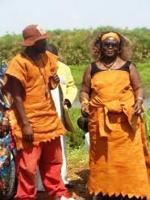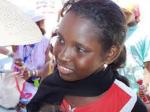Old Boma Hotel
After a bumpy,dusty drive from Mtwara airport you arrive to a very calm peaceful environment at Old Boma Hotel in Mtwara Area Tanzania. The Old Boma is a small renovated colonial residence. Don't expect the same amenities of all the chain hotels .There are no phones, tvs or hair blowers in the rooms. Bring your own shampoo! But that been said, the charm over rides all that...the rooms are large, beds are big and comfortable. There is no a/c but even in the warm months the rooms stay cool and have overhead fans. You will sleep under mosquito nets.
The pool area and grounds are beautiful.
The food is good, cooked fresh, but limited.
Staff were helpful..one nice surprise was free
wifi in the reception area!
Trade Aid operates a small area selling goods
made by local artisans.
The Old Boma is a colonial era German residence which towers above sleepy Mikindani village like a white walled castle. From the terrace you can look out over the horseshoe shaped bay.
A visit to the hotel feels like a trip back in time to colonial days, but with some modern adjustments like a gorgeous swimming pool in the courtyard.
The hotel makes a good base for interesting and slightly left field excursions, such as dhow sailing, land trips to the Mozambique border and swimming/snorkelling at the picture perfect Mnazi Bay.
The village has a surprising number of expatriates, many associated with aid projects. The Old Boma itself is an aid project run by the UK agency Trade Aid, and most of the staff are from Mikindani village.
The service here is good, but not overly attentive, and is probably best suited to travellers with a taste for adventure and the unusual.
The cooking is excellent including hot African donuts dipped in sugar and cardamom served with tea every afternoon on a terrace overlooking the ocean.
There is also a cool bar in the village with good cooking called 10 degrees south, and a professional diving outfit called Eco2
Mikindani is a beatuful and unspoiled coastal
fishing/farming town, largely comprising thatched mud houses and a few old
colonial buildings (some of which are now ruins).
A short stroll through the centre will elicit dozens of greetings from the local people, so I'd recommend practicing a few Swahili words if you don't speak the language. It is extremely rare to see a white face around, apart from the odd NGO worker.
Apart from the manager, the hotel is staffed almost entirely by local people.
Food and service are good, but don't come expecting five-star treatment.
Most of the staff have barely been outside the village and have little idea what a Western-style hotel or restauant is like, but they all try incredibly hard and the result is charming if a little idiosyncratic.
The menu is fairly Western and features plenty of local fish and
seafood (as well as bread and butter pudding!).
Rooms are spacious and pleasant with comfortable
beds and simple concrete floors.
There are lots of balconies and terraces where
you can have afternoon tea (watch out for the doughnuts) and watch the sun set
over the bay. Budget around £15 per day for lunch and dinner.
There are some lovely walks direct from the Boma
but take a pair of stout boots if you want to explore as there are a few snakes
around.
You can swim in Mikindani bay but there isn't a beach as such - the best option is to take the Boma's excursion to Msimbati where there is miles of deserted sand.
We didn't dive, but went out for some superb snorkelling with
eco2 who are based five minutes' walk from the Boma.
Profits from the Boma go to local educational
and micro-finance projects in the village and the management of this charitable
work seemed to us to be excellent.
Creating and running a place like this in such a
challenging environment (in every possible sense) is a great achievement, both
by the Trade Aid charity and the local people.
We felt quite conscious of the slightly colonial-style ethics of living a comfortable existence in the midst of a fairly poor area, but there is consolation in the fact that the place provides employment for around 35 local people and profits go straight back into the local community.
The best thing is that you are situated in the
middle of the local village which makes the experience so unique.
You can see
and hear people going about their daily lives, you can wonder around the
village without hassle and sit on the key side and watch the sun set.
I'd recommend going diving or snorkling with
ECO2, run by an English guy in the same village. Stunning reefs and islands to
visit.

Recent Articles
-
Garam Masala Appetizers ,How to Make Garam Masala,Kenya Cuisines
Sep 21, 14 03:38 PM
Garam Masala Appetizers are originally Indian food but of recent, many Kenyans use it. Therefore, on this site, we will guide you on how to make it easily. -
The Details of the Baruuli-Banyara People and their Culture in Uganda
Sep 03, 14 12:32 AM
The Baruuli-Banyala are a people of Central Uganda who generally live near the Nile River-Lake Kyoga basin. -
Guide to Nubi People and their Culture in Kenya and Uganda
Sep 03, 14 12:24 AM
The Nubians consist of seven non-Arab Muslim tribes which originated in the Nubia region, an area between Aswan in southern







New! Comments
Have your say about what you just read! Leave me a comment in the box below.